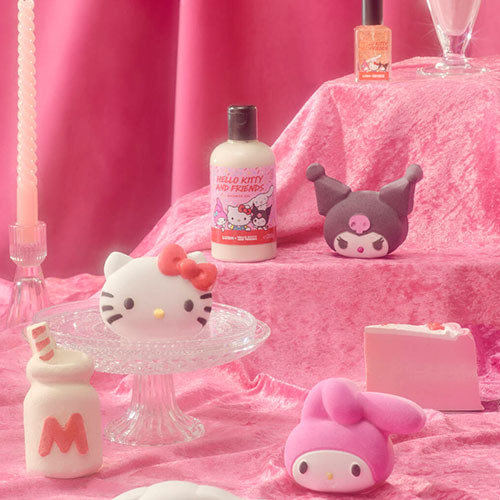Forbidden Planet is a great example of a retailer that knows its market, understands its customers and remains proactive about its approach to retailing, says Start Licensing’s Ian Downes.
It was great to be able to visit one of my favourite shops this week… I popped into Forbidden Planet’s flagship ‘superstore’ in Shaftesbury Avenue.
Forbidden Planet has been a vibrant part of the London retail scene for many years – I remember this store’s predecessor on New Oxford Street from years ago. Fan culture, pop culture and fan driven licensing are well known and recognised now of course, but stores like Forbidden Planet were supporting this category before it became more mainstream.
For fans of genres like sci-fi, manga, role playing and animé, Forbidden Planet was a destination store. Given the increased competition in the category not least from online sellers it was good to see how busy the shop was. Plenty of customers shopping and a long queue waiting to buy things. My quick and unscientific analysis of customers suggests that there are lots of younger consumers visiting the store along with overseas visitors and, of course, older customers who I assume are long-term customers. I also noted lots of family groups with children shopping with parents and their ‘fandom’ being shared across the generations.
It would be a very lengthy Lookout if I listed all the licensing I saw in store – Forbidden Planet is a great supporter of licensing and licensees – so I have confined myself to a few highlights and observations.
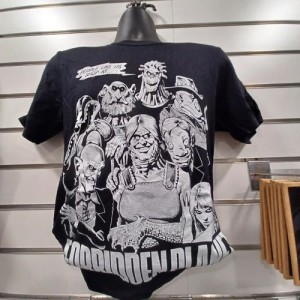 One thing that is very clear is that Forbidden Planet is a destination store and one reason for this is the comprehensive range of product on sale, but I think also the fact that customers feel the shop is for them and a location they can rub shoulders with kindred spirits.
One thing that is very clear is that Forbidden Planet is a destination store and one reason for this is the comprehensive range of product on sale, but I think also the fact that customers feel the shop is for them and a location they can rub shoulders with kindred spirits.
This notion is underpinned when looking at Forbidden Planet’s own range of merchandise – the strapline for the range which includes t-shirts is People Like Us Shop At Forbidden Planet accompanied by a design featuring a range of original sci-fi and fantasy characters. There is a sense that as a shopper at Forbidden Planet you have joined a club – but it is a club that is getting bigger!
Another nice touch in-store is how it plays tribute to noteworthy talent when they pass away. At the moment it has a tribute to Nichelle Nichols who played Uhura in Star Trek and who died in July. This helps build a sense of community. Another dimension of this is that the store hosts lots of signings, book launches and talent appearances.
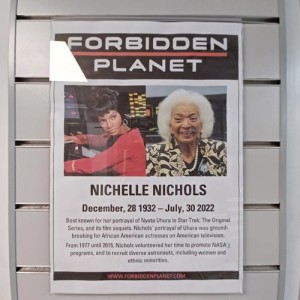 A key reason for lots of people to visit Forbidden Planet is to buy comics and the shop supports comics and comic publishers well with a broad range of titles in-store. A key focus is the Comic Chart display as well as a dedicated area for the week’s new releases. Customers know they are likely to find what they are looking for and that it will be available in-store. It also keeps a good supply so if a customer misses a week they know recent copies will remain on sale.
A key reason for lots of people to visit Forbidden Planet is to buy comics and the shop supports comics and comic publishers well with a broad range of titles in-store. A key focus is the Comic Chart display as well as a dedicated area for the week’s new releases. Customers know they are likely to find what they are looking for and that it will be available in-store. It also keeps a good supply so if a customer misses a week they know recent copies will remain on sale.
Comics, books and publishing generally are strong areas for Forbidden Planet. A current promotion is focused on a 3 for 2 offer on manga titles.
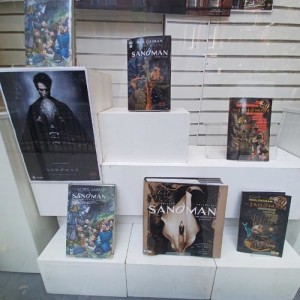 Given its knowledge of the sector and the links it has forged with IP owners, Forbidden Planet is also good at taking advantage of new launches and IP driven events, making sure they are part of new launches.
Given its knowledge of the sector and the links it has forged with IP owners, Forbidden Planet is also good at taking advantage of new launches and IP driven events, making sure they are part of new launches.
For example at the moment it has a window display and feature for The Sandman which has recently launched as a Netflix series. The series is based on a comic book series developed by Neil Gaiman. A series which would be well known to Forbidden Planet and its customers.
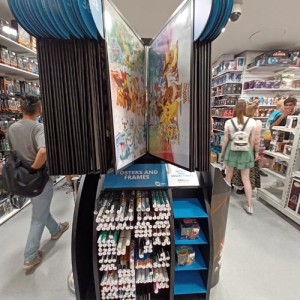 Another pleasing feature of the Forbidden Planet store is its willingness to support product categories with dedicated space and displays. For example it has a poster display full of posters that you can look at and ‘flick through’. Being able to look at, browse and ‘discover’ things in this way appeals to Forbidden Planets’ customers and is part of the shopping experience they enjoy. It seems to work on this with GB eye/Abysse.
Another pleasing feature of the Forbidden Planet store is its willingness to support product categories with dedicated space and displays. For example it has a poster display full of posters that you can look at and ‘flick through’. Being able to look at, browse and ‘discover’ things in this way appeals to Forbidden Planets’ customers and is part of the shopping experience they enjoy. It seems to work on this with GB eye/Abysse.
Likewise it supports specific franchises well – for example 2000AD has its own section in-store and it stocks all the latest book releases from Rebellion associated with that comic’s archive, history and artists. Fans know this and that encourages them to pop into the shop.
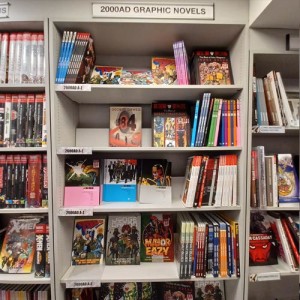 It is also good at picking up and helping to develop new trends – for example it carries a lot of craft-related books and kits such as Star Wars Crochet book kits and it also supports specialist categories such as high-end books on video game art – featured titles included Sniper Elite and Arkham Horror.
It is also good at picking up and helping to develop new trends – for example it carries a lot of craft-related books and kits such as Star Wars Crochet book kits and it also supports specialist categories such as high-end books on video game art – featured titles included Sniper Elite and Arkham Horror.
While supporting more specialist categories Forbidden Planet doesn’t neglect the big performing categories and brands such as Funko. Pop! vinyl figures feature in lots of locations around the store and it is clear a collectable people are still collecting!
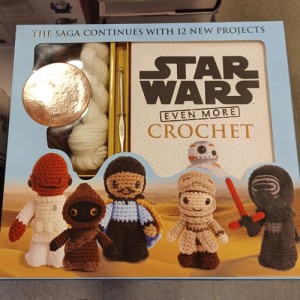 It was also good to see that it is working with some newer licensees and categories. It had a good range of Pinfinity augmented reality pin badges – Pinfinity is a relatively new licensee working on licences such as Street Fighter. Being on sale in Forbidden Planet is a great location for it and should be a good platform to build from. It is also good to see Forbidden Planet supporting categories such as lighting. This is a category that has developed in a fresh way in recent times with more product developed for adult consumers focused around desk lamps and gifting lines.
It was also good to see that it is working with some newer licensees and categories. It had a good range of Pinfinity augmented reality pin badges – Pinfinity is a relatively new licensee working on licences such as Street Fighter. Being on sale in Forbidden Planet is a great location for it and should be a good platform to build from. It is also good to see Forbidden Planet supporting categories such as lighting. This is a category that has developed in a fresh way in recent times with more product developed for adult consumers focused around desk lamps and gifting lines.
One of the highlights in the lights department was a Space Invaders desk lamp. This is also a sign that fandom is shifting a bit product wise with lifestyle and homewares products starting to come to the fore. It isn’t just about mugs, t-shirts and posters anymore. Other licensed lines that were supported in-depth in multiple locations around the store included Running Press’ mini kits and books such as a Ghostbusters P.K.E. Meter with Light and Sound. These sort of items work well as gifts and impulse purchases. I think a lot of Forbidden shopper customers are browsers who ‘top up’ their main purchase with pick up lines.
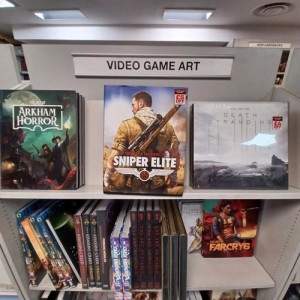 Connected to this is the fact that Forbidden Planet carries blind bag style products with lots of these kind of collections located at till points. Other categories that are supported in-depth include board games and role-play games. It was also interesting to see that computer gaming properties were a strong feature in store showing how their appeal stretches across all kinds of retail these days. One particular highlight was The Official Halo cookbook, confirming that a big part of the shop’s appeal is its eclectic approach to range development and stock holding.
Connected to this is the fact that Forbidden Planet carries blind bag style products with lots of these kind of collections located at till points. Other categories that are supported in-depth include board games and role-play games. It was also interesting to see that computer gaming properties were a strong feature in store showing how their appeal stretches across all kinds of retail these days. One particular highlight was The Official Halo cookbook, confirming that a big part of the shop’s appeal is its eclectic approach to range development and stock holding.
Forbidden Planet is a great example of a retailer that knows its market, understands its customers and remains proactive about its approach to retailing. I think it also recognises that licensing unlocks a lot of good opportunities and builds credibility with its customers.
It is also a great place to see a whole range of interesting products and seeing shoppers enjoying their shopping experience.
Ian Downes runs Start Licensing, an independent brand licensing agency. His Twitter handle is @startlicensing – he would welcome your suggestions for what to look out for.



























